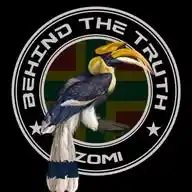
𝔹𝔼ℍ𝕀ℕ𝔻 𝕋ℍ𝔼 𝕋ℝ𝕌𝕋ℍ (𝔹𝕋𝕋)
January 26, 2025 at 04:08 AM
*Day 7: The Politics of Naming*
Names are not merely words; they are acts of power, defining how individuals and communities perceive themselves and are perceived by others. They are tools of recognition and control, shaping the dynamics of identity and belonging. _For the Zomi, the politics of naming has been a long and contested struggle, marked by external impositions and resilient acts of reclamation_.
Colonial authorities, in their effort to classify and control, imposed names like "Chin" and "Kuki," erasing the self-designated term Zomi. These labels were not neutral descriptors but instruments of fragmentation designed to simplify and categorize complex identities. As Thangkhangin (1979) notes, *the term Chin possibly arose from the Burmese word for basket, a utilitarian symbol that reduced the Zomi identity to a single image*. _Similarly, the term Kuki, introduced by Bengali neighbours, carried connotations of "wild hill people," further exoticizing and marginalizing the Zomi(Thangkhangin, 1979, p. 8)_.
These names served as tools of erasure, embedding the Zomi into narratives, not of their own making. They disregarded the deep history and cultural unity expressed in the name Zomi. However, the Zomi resisted. As mentioned in our previous posts, _Vumson emphasizes how we have called ourselves Zomi from time immemorial_. This defiant assertion was more than a statement of identity; it was an act of self-determination. _By reclaiming Zomi, the people resisted the fragmentation imposed by colonial powers and reaffirmed their shared origins and cultural pride_.
Naming, however, is not unique to the Zomi's story. Throughout history, the powerful have used names to subjugate and control. The Roman Empire renamed conquered territories to impose its dominance. _In colonial contexts, surnames were forced upon enslaved peoples to strip them of their lineage and autonomy_. The Zomi experience reflects this broader historical pattern, but their resistance also exemplifies the transformative power of reclaiming a name.
_To reclaim a name is to reclaim an agency. As read in the Indigenous Zomi, it is a declaration of cultural survival, a refusal to be erased, and an assertion of a people's right to define their identity_. For the Zomi, _Zomi is not just a name; it is a narrative of resilience, a banner under which divided communities unite_. It transcends colonial borders and speaks to a shared identity that has withstood attempts at suppression.
Reclaiming Zomi is not just about the past—it is about the future. It signals a refusal to be defined by external forces and a commitment to self-determination. *As Vumson (1986) reflects, the endurance of the name Zomi is a testament to the people's strength and unity, a reminder that names are not just words but acts of self-definition*.
The politics of naming invites reflection. What does it mean to choose your name or to have it chosen for you? How does this act shape identity, belonging, and power? _For the Zomi, naming has been an act of reclamation, a defiance against historical erasure, and a step toward a collective future where their narrative is defined by them alone_.
*Reflection:*
What does it mean to reclaim a name? Consider the power dynamics in naming. How does the ability to name—or rename—shape identity and relationships?
*Takeaway:*
To name oneself is the first act of freedom. _For the Zomi, reclaiming their name was an assertion of agency and unity in the face of external attempts to fragment their identity_.
*Quote to Highlight:*
*"Names are more than labels; they are acts of self-definition, and in claiming Zomi, the people reclaimed their history and their future."*
*Challenge:*
Reflect on the names given to you or your community. Were they chosen, or were they imposed? How does this shape your sense of self and belonging?
*BTT*
🔴🟡🟢
https://whatsapp.com/channel/0029VaYCqe71yT229xZ6f42y
👍
❤️
😂
✅
💯
🐒
🐖
47